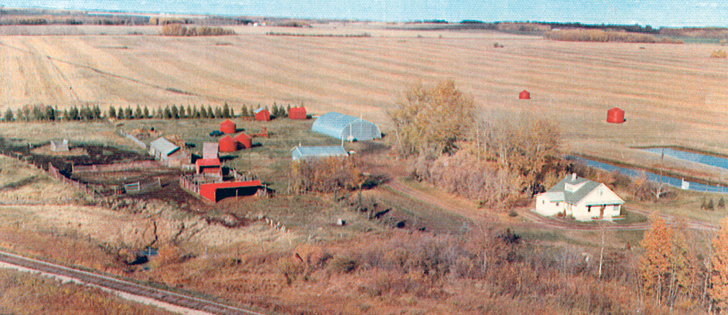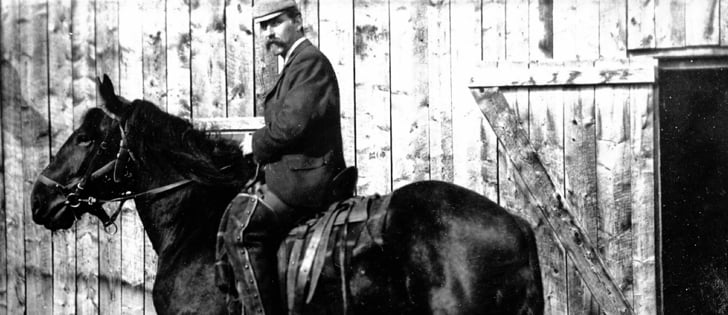Waste not, want not | Thrifty couple raised a family by taking off-farm jobs and growing and preserving their food
BIGGAR, Sask. — Ruby and Max Gamble sit next to each other on a pile of old boards in their farmyard. It’s a pleasantly warm spring evening.
The planks of wood are weathered grey floorboards pulled piece by piece from an old building Max tore down years ago.
Wafting through the air is the occasional huff from the bull pen. Walls of the corral are some of the same weather-beaten floorboards. The chores are done.
Intermingled are the good-hearted and contagious cackles from Ruby as she recounts their life on the farm. A storyteller at heart, this evening she commands an audience of barn cats, occasionally acknowledging her presence with their purring rubs.
Read Also

Nutritious pork packed with vitamins, essential minerals
Recipes for pork
Max seems content to listen, head down, stoic, with gnarled hands grasping a weather beaten cane, like the boards below him.
Their farmyard borders Highway 14, east of Biggar. Like many farms, it has become a kind of time capsule.
A worn down set of discs lies half buried, the door to a vintage grain truck sits slightly ajar and a child’s wagon rusts against a rickety fence, perhaps where it was last played with years earlier.
An observer travelling the highway might see the farmyard as littered with pieces of farm machinery and debris.
However, there is more to the Gambles’ story than what first meets the eye. The scattered remnants are like a diary of life on a farm spanning half a century. The memories are rich. Rust never sleeps.
With two quarters of land they bought from Ruby’s father a few years after they married in 1958, the Gambles were never big farmers, even in those days.
They had 30 head of dairy and beef cattle, a few old tractors and a small house, in which they set to raising their children: two daughters and a son, Lorraine, Tracy and Bruce.
Milking cows by hand and making and selling their cream kept them busy and involved the entire family.
With no indoor plumbing, one of the children’s daily chores was hauling water from a well half a kilometre away using their play wagon.
Ruby said thriftiness was a way of life: mending clothes, splitting wood, hauling water and growing their own food.
“We were self-sufficient on the farm,” she said.
A major setback in 1978 forced the young family to alter their course.
Brucellosis wiped out their Guernsey dairy herd and put their burgeoning milk and cream business on hold. It took several years to start over and rebuild the herd.
“That was bad. It knocked us on our rear ends,” she said.
Thriftiness as a way of life before the outbreak became survival afterward. Their mantra, “waste not, want not,” shapes them to this day.
“We had to survive. We never wasted a thing. I grew everything I could in the garden. I canned and baked everything I could. Worked like demons, really,” Ruby said.
Max and Ruby were forced to take off-farm jobs to support their young family. For the next 12 years, Ruby held a variety of jobs in Biggar: grocery store clerk, waitress, bartender and even bouncer.
With her infectious chuckle, she recalls having to restrain an unruly customer by sitting on him outside the bar until the police arrived.
Max was a janitor at the local bank, post office and Co-op store. A job at the local dump allowed him to find many useful discards.
A new dairy herd brought long days filled with milking cows by hand and making cream. Family chores and off-farm jobs left little time for precious sleep.
“I said if I lived my life a second time I wouldn’t do them both at once,” said Ruby.
Lorraine still remembers and cherishes a Christmas present her parents gave her when she was about five. She and her sister received a dressed up doll along with their orange and bag of candy.
Only years later did Lorraine learn her father had rescued the dolls from the dump, its clothes cleaned and mended by their mother in time for Christmas morning. Lorraine said they were never happier.
“We made the most of the land. We had to,” Ruby said.
“We raised the kids on that and I don’t think they did without a lot. We made sure they had clothes to wear and their clothes were clean and everything for school.”
Lorraine and her husband, Clifford, have taken over running the small operation, which today is not much bigger than it was originally, averaging 35 head of Black and Red Angus. They too have off-farm jobs.
The small herd has never been a profitable venture for them.
“You want to carry on the farm tradition. It’s OK that we took a loss all those years. I did it for my parents, as crazy as that sounds,” said Lorraine.
“You live in harmony. I’ve always had a great relationship with my parents…. So what if we carry a loss every year. We choose that life.”
The thriftiness that Max and Ruby have spent a lifetime honing is serving them well now. They continue to grow a large garden, can, bake, buy in bulk and mend their secondhand clothing.
“It’s like squeezing the dollar twice before you spend it. Everything is up in price now. We’re kind of thrifty with our stuff. We’re not going to feel too much. It’s just going to continue because it’s the way the economy is now,” said Ruby.
“We’re from a big family and we knew what struggle was. We knew if you didn’t hold the potatoes, you probably wouldn’t have nothing to eat for winter. You had to work to eat.… It was a good life, but it was survival.”


















